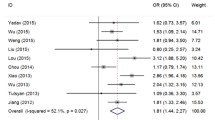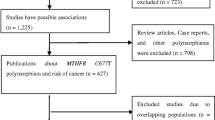Abstract
The CD14-260C/T polymorphism has been implicated to be in association with malignant tumor. However, a number of studies have reported inconclusive results. The aim of this study was to investigate the relationship of CD14-260C/T polymorphism and malignant tumor risk by meta-analysis. A search was performed in PubMed, Embase, the Chinese Journals Full-text Database (CNKI), and Wanfang databases up to August 2013. Odds ratio (OR) and 95 % confidence interval (95 % CI) were used to assess the association. Statistical analysis was calculated by STATA 11.0 software. The polymorphism was identified from 11 articles (12 case–control studies), involving 2,660 cases and 2,943 controls. Overall, no significant association between CD14-260C/T polymorphism and malignant tumor risk was found in the dominant model (TT + TC vs. CC: OR = 0.86, 95 % CI = 0.67–1.11). In the subgroup analysis by malignant tumor types, we found that the heterozygote model (TC vs. CC) might reduce the risk of malignant tumor, especially hematological malignance and prostate cancer (OR = 0.67, 95 % CI = 0.47–0.95), but not associated with gastrointestinal cancer susceptibility. In the subgroup analysis by ethnicity, no significant associations were found among different ethnicities. The study suggested that CD14-260C/T polymorphism might be a protective factor for hematological malignance and prostate tumor susceptibility but not an independent risk factor for gastrointestinal cancer susceptibility. To further evaluate the association between the polymorphism and malignant tumor susceptibility, more studies involving thousands of patients are required.



Similar content being viewed by others
References
Bredberg A. Cancer: more of polygenic disease and less of multiple mutations? A quantitative viewpoint. Cancer. 2011;117(3):440–5.
Goyert SM, Ferrero E, Rettig WJ, Yenamandra AK, Obata F, Le Beau MM. The CD14 monocyte differentiation antigen maps to a region encoding growth factors and receptors. Science. 1988;239(4839):497–500.
Hubacek JA, Pit’ha J, Škodová Z, Stanĕk V, Poledne R. C (−260) → T polymorphism in the promoter of the CD14 monocyte receptor gene as a risk factor for myocardial infarction. Circulation. 1999;99(25):3218–20.
Zhang DE, Hetherington CJ, Tan S, Dziennis SE, Gonzalez DA, Chen HM, et al. Sp1 is a critical factor for the monocytic specific expression of human CD14. J Biol Chem. 1994;269(15):11425–34.
Pugin J, Heumann D, Tomasz A, Kravchenko VV, Akamatsu Y, Nishijima M, et al. CD14 is a pattern recognition receptor. Immunity. 1994;1(6):509–16.
Ziegler-Heitbrock H, Ulevitch R. CD14: cell surface receptor and differentiation marker. Immunol Today. 1993;14(3):121–5.
Macatonia SE, Hosken NA, Litton M, Vieira P, Hsieh CS, Culpepper JA, et al. Dendritic cells produce IL-12 and direct the development of Th1 cells from naive CD4+ T cells. J Immunol. 1995;154(10):5071–9.
Nagai Y, Akashi S, Nagafuku M, Ogata M, Iwakura Y, Akira S, et al. Essential role of MD-2 in LPS responsiveness and TLR4 distribution. Nat Immunol. 2002;3(7):667–72.
Wu CY, Wang CJ, Tseng CC, Chen HP, Wu MS, Lin JT, et al. Helicobacter pylori promote gastric cancer cells invasion through a NF-kappaB and COX-2-mediated pathway. World J Gastroenterol. 2005;11(21):3197.
Mori N, Sato H, Hayashibara T, Senba M, Geleziunas R, Wada A, et al. Helicobacter pylori induces matrix metalloproteinase-9 through activation of nuclear factor κB. Gastroenterology. 2003;124(4):983–92.
James BP, Sicheng W, Qiang PH, Marianne QJ. Secretion of matrix metalloproteinase‐9 by macrophages, in vitro, in response to Helicobacter pylori. FEMS Immunol Med Microbiol. 2005;45(2):159–69.
Guo Q, Zhu J, Xia B. Polymorphism of CD14 gene but not the mutation of TLR4 gene is associated with colorectal cancer in Chinese patients. J Gastroenterol Hepatol. 2006;21(1):92–7.
Andrie E, Michos A, Kalampoki V, Pourtsidis A, Moschovi M, Polychronopoulou S, et al. Genetic variants in immunoregulatory genes and risk for childhood lymphomas. Eur J Haematol. 2009;83(4):334–42.
Hold GL, Rabkin CS, Gammon MD, Berry SH, Smith MG, Lissowska J, et al. CD14-159C/T and TLR9-1237 T/C polymorphisms are not associated with gastric cancer risk in Caucasian populations. Eur J Cancer Prev. 2009;18(2):117.
Tahara T, Shibata T, Hirata I, Nakano H, Arisawa T. Retracted article: CD14 promoter-159 polymorphism is associated with reduced risk of intestinal-type gastric cancer in a Japanese population. Dig Dis Sci. 2009;54(7):1508–12.
Min ZC, Mi YY, Shao N, Feng YH, Hua LX. Association between CD14-260 polymorphism and the risk of the prostate cancer. J Mod Urol. 2012;17(2):118–21.
Wu MS, Cheng TY, Shun CT, Lin MT, Chen LC, Lin JT. Functional polymorphisms of CD14 and toll-like receptor 4 in Taiwanese Chinese with Helicobacter pylori-related gastric malignancies. Hepato-Gastroenterology. 2005;53(71):807–10.
Yu X, Zhang C, Sun A, Jiang L, Zheng J, You Y, et al. Genetic variations in CD14 promoter and acute lymphoblastic leukemia susceptibility in a Chinese population. DNA Cell Biol. 2011;30(10):777–82.
Hao WY, Liang H. The influence of CD14-260 and-651 C/T polymorphism in H. pylori infection-related gastric carcinoma. Dissertation, Nankai University. 2010.
Landi S, Gemignani F, Bottari F, Gioia-Patricola L, Guino E, Cambray M, et al. Polymorphisms within inflammatory genes and colorectal cancer. J Negat Results Biomed. 2006;5(1):15.
Zhao D, Sun T, Zhang X, Guo Y, Yu D, Yang M, et al. Role of CD14 promoter polymorphisms in Helicobacter pylori infection-related gastric carcinoma. Clin Cancer Res. 2007;13(8):2362–8.
Castaño-Rodríguez N, Kaakoush NO, Goh KL, Fock KM, Mitchell HM. The role of TLR2, TLR4 and CD14 genetic polymorphisms in gastric carcinogenesis: a case–control study and meta-analysis. PLoS ONE. 2013;8(4):e60327.
Zhu LX, Ho SC, Wong TK. Effectiveness of health education programs on exercise behavior among patients with heart disease: a systematic review and meta-analysis. J Evid Based Med. 2013;6(4):265–301.
Zhan M, Xu T, Wu F. Sitagliptin in the treatment of type 2 diabetes: a meta-analysis. J Evid Based Med. 2012;5(3):154–65.
Conflict of interest
None
Author information
Authors and Affiliations
Corresponding authors
Rights and permissions
About this article
Cite this article
Tong, X., Li, Z., Fu, X. et al. The association between CD14-260C/T polymorphism and malignant tumor risk: a meta-analysis of 5,603 participants. Tumor Biol. 35, 8707–8713 (2014). https://doi.org/10.1007/s13277-014-2040-8
Received:
Accepted:
Published:
Issue Date:
DOI: https://doi.org/10.1007/s13277-014-2040-8




